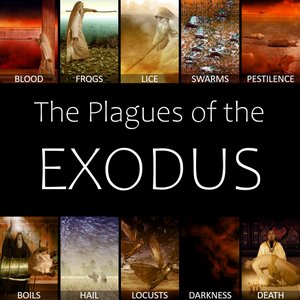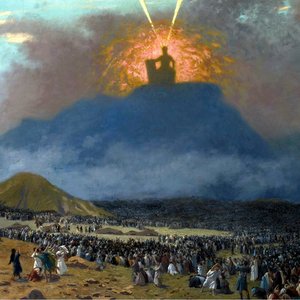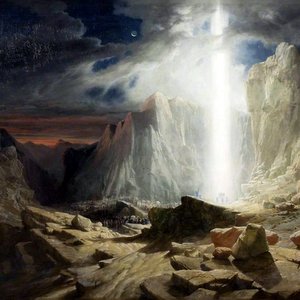Commentary

Informed by Scripture, history, and the languages of the Bible, this Commentary section contains brief articles capturing my thoughts on various matters of faith and life. These articles provide, let's say, "uncommon" perspectives to enlighten and encourage, and (hopefully) challenge. I always seek to be firmly grounded in the Bible, and since I'm not wed to any denominational traditions, I can strive to uncover the truth and share the Good Word.
This section also has articles by guest authors that answer challenging questions that often go unasked in mainstream Christian congregations, compare the concerns of believers today with those of the early Church, and address practical (but often overlooked) matters like dealing with offense and practicing forgiveness.
Guest authors include:
- Ron Ammundsen
- Dr. Daniel Botkin
- Dr. S. Bryson

But sanctify Christ as Lord in your hearts, always being ready to make a defense to everyone who asks you to give an account for the hope that is in you, yet with gentleness and reverence... (1 Peter 3:15)
Apologetics is the practice of providing a defense or answers to challenges. The word "apologetics" comes from the Greek word Peter used in the verse noted above: apologia.
- Details
- One Messianic Gentile

Scripture tells us that the earth is full of G-d's glory.
And one called out to another and said, "Holy, Holy, Holy, is the LORD of hosts, The whole earth is full of His glory." (Isaiah 6:3)
Within creation, each created thing serves to glorify its Creator in its unique way. In addition to the unique way G-d is glorified, they can glorify or sanctify the LORD in varying degrees. As a simple example, let's consider a sheep.
- Details
- One Messianic Gentile

Each year during Passover, we read through the history of the Exodus and recount the ten plagues that G-d visited upon Egypt. During a recent study through the book of Revelation, we also noticed an interesting repetition of the same types of plagues mentioned there. I thought the parallels were fascinating and worth recording.
- Details
- One Messianic Gentile

As more and more believers come to recognize Yeshua as the Jewish Messiah of Israel, questions arise about how to walk as He walked: in obedience to G-d's Law.
First, I'll state that I do not have all the answers. Nobody does. So be cautious of anyone who claims that they do.
This article only intends to offer the collective thoughts, experiences, and opinions I've garnered from my congregation and other believers. It should serve as a guide to individuals new to walking out G-d's commandments.
- Details
- One Messianic Gentile

The United States Congress established the Days of Remembrance as our nation’s annual commemoration of the Holocaust and created the United States Holocaust Memorial Museum as a permanent living memorial to the victims. In 2013, the Museum designated Never Again: Heeding the Warning Signs as the theme for the annual observance. In accordance with its Congressional mandate, the Museum is responsible for leading the nation in commemorating the Days of Remembrance and for encouraging and sponsoring appropriate observances throughout the United States.
- Details
- One Messianic Gentile

During a recent Bible study, the question was asked: "Is Yeshua G-d?"
Some immediately responded, "Yes, He is!"
Others quickly retorted, "No, He is not!"
There are compelling points of Scripture on both sides of the debate. After considering all of the passages for and against, my conclusion is the Messiah Yeshua is indeed G-d.
- Details
- One Messianic Gentile

I recently added an apocryphal reference to the site: "The Teaching of the Lord to the Gentiles by the Twelve Apostles," also known as the Didache [Greek: teaching]. The Didache is a short, first-century document attributed to the twelve apostles and thought to be the basic instructions for Gentile believers who were new to the faith. While it is not Scripture, the Didache definitely provides valuable insight into the Apostles' early teachings.
This article is not an exhaustive examination of the Didache. Instead, it provides some highlights from and observations about this historical document and its teachings.
- Details
- One Messianic Gentile

The Biblical principles regarding offense and forgiveness described here are essential to community life.
The discussion that prompted this article was a study on Colossians 3, verses 1-17, but a great deal of time was also spent discussing verses 12-14.
- Details
- S. Bryson

In the Summer 2010 edition of Messiah Journal by First Fruits of Zion, Derek Leman reviews a book entitled "Mapping Messianic Jewish Theology" by Richard Harvey. In the review, Mr. Leman recounts seven "pressing questions" for Messianics from the book.
I developed a position on these points and wanted to share my answers to those questions. Although it should go without saying, I want to make it plain that my answers to these questions may change with additional study and prayer.
- Details
- One Messianic Gentile

And one called out to another and said, “Holy, Holy, Holy, is the Lord of hosts, The whole earth is full of His glory.” (Isaiah 6:3)
The angels declare that the G-d of Abraham, Isaac, and Jacob, the LORD of hosts, is "Holy, Holy, Holy." This is a poetic way of saying He is most Holy.
So what is holiness, and how is G-d most Holy?
- Details
- One Messianic Gentile

And I saw heaven opened, and behold, a white horse, and He who sat on it is called Faithful and True, and in righteousness He judges and wages war. His eyes are a flame of fire, and on His head are many diadems; and He has a name written on Him which no one knows except Himself. He is clothed with a robe dipped in blood, and His name is called The Word of God. And the armies which are in heaven, clothed in fine linen, white and clean, were following Him on white horses. From His mouth comes a sharp sword, so that with it He may strike down the nations, and He will rule them with a rod of iron; and He treads the wine press of the fierce wrath of God, the Almighty. And on His robe and on His thigh He has a name written, "KING OF KINGS, AND LORD OF LORDS."
(Revelation 19:11-16)
- Details
- One Messianic Gentile

If a person has a fair amount of exposure to Mainstream Christianity, and a familiarity with the Bible, he may notice that Mainstream Christianity often de-emphasizes the Old Testament and puts a disproportionate amount of emphasis on Paul's epistles. I would hesitate to say that any part of the Scriptures can be overemphasized. However, if we give uncalled-for weight and emphasis to certain parts of the Bible, and neglect what the rest of the Scriptures teach about an issue, we will probably develop an imbalanced view of that particular issue.
- Details
- Dr. Daniel Botkin

Scripture refers to special times or appointed festivals using the Hebrew word מוֹעֲדִים (moedim). I've compiled this list and summary of G-d's appointed times, where each is found in Scripture, and notes regarding how some groups or individuals observe each moed. A more detailed explanation of G-d's calendar can be found in my article entitled What Scripture Says About G-d's Appointed Times. More details about each moed can be found in our series of articles about the Moedim.
Let's begin with the first of the LORD's appointed times: the weekly Sabbath.
- Details
- One Messianic Gentile

The book of Hebrews describes Messiah Yeshua as a priest in the order of Melchizedek
Who is Melchizedek, and what is his "order"? He is an enigma.
Let's examine Scripture and see what it can tell us about the mystery of Melchizedek.
- Details
- One Messianic Gentile

When I renewed my walk of faith, I began studying Scripture earnestly and examining the original languages behind our modern English translations. I also started taking a great interest in the definition and origin of the English words used by translators. One of the words I investigated was the word "testament," which is used to describe the two portions of the Christian Bible: the "Old Testament" and the "New Testament". This led me down a path of study and investigation that I hope you find enlightening and encouraging.
- Details
- One Messianic Gentile

A dear friend and contributor to this website, Brent, shared his insight into the parable of the vineyard and brought in various other Scriptures to elucidate the passage. Doing so sparked a rather exciting discussion about vines, vineyards, vine dressers, and wine as metaphors used throughout the Apostolic Writings. This article highlights our discussion points and the other insights he provided. I credit him for inspiring this article in the spirit of Proverbs 3:27. And as always, I thank G-d Most High, who "gave the heart understanding to distinguish between day and night."
- Details
- One Messianic Gentile

Each year, as we read through Exodus chapters 7-12 as part of the annual Torah reading cycle and as part of the readings for Pesach, we find ten plagues that were visited upon Egypt. Curious, I decided to examine the variations between the events of each plague and the patterns within the plague narrative. What I've found is engaging and thought-provoking.
- Details
- One Messianic Gentile

The 2001 Walt Disney movie, The Princess Diaries unintentionally provides a picture of salvation for believers. Here is the plot summary from imdb.com:
[Mia], a socially awkward but very bright 15-year-old girl being raised by a single mom, discovers that she is the princess of a small European country because of the recent death of her long-absent father, who, unknown to her, was the crown prince of Genovia. She must make a choice between continuing the life of a San Francisco teen or stepping up to the throne. While Mia makes up her mind, she's pressed into taking princess lessons from her grandmother.
- Details
- One Messianic Gentile

During a recent reading and discussion of the book of Revelation, this passage in chapter 19 caught everyone's attention:
It was given to her to clothe herself in fine linen, bright and clean; for the fine linen is the righteous acts of the saints. (Revelation 19:8)
What are these righteous acts? Can we do them? Should we do them?
- Details
- One Messianic Gentile

An old friend recently began teaching about a passage from Matthew:
"You are the salt of the earth; but if the salt has become tasteless, how can it be made salty again?" (Matthew 5:13)
Familiar with my interest in the Hebrew/Jewish perspective of things, he asked if there was anything, in particular, I knew about that verse. Unfortunately, I did not... but I set out to study the passage to develop a better understanding of it.
I began with the three basics: context, context, context! :)
- Details
- One Messianic Gentile

The accounts of G-d's interactions with Moses and the people of Israel fill the book of Exodus. One passage, in particular, is overflowing with G-d's revelation of Himself. It's the passage where G-d commands Moses to create two new stone tablets.
The LORD descended in the cloud and stood there with him as he called upon the name of the LORD. Then the LORD passed by in front of him and proclaimed, "The LORD, the LORD God, compassionate and gracious, slow to anger, and abounding in lovingkindness and truth; who keeps lovingkindness for thousands, who forgives iniquity, transgression and sin; yet He will by no means leave the guilty unpunished, visiting the iniquity of fathers on the children and on the grandchildren to the third and fourth generations." Moses made haste to bow low toward the earth and worship. (Exodus 34:5-8)
- Details
- One Messianic Gentile

There has been significant discussion among my congregation's families about using the sacred name of G-d. My primary observation at this time:
- We are not saved by works (Ephesians 2:8-9, 2 Timothy 1:9), so there is no requirement to speak the sacred name of G-d for the purpose of salvation.
Update 12/09/2010:
The Psalm 119 Foundation is pleased to announce our partnership with Gary Mink in delivering his insightful observations and commentary about the Sacred Name Movement and the use of the Sacred Name of G-d. In support of this partnership, I've designed and implemented Mr. Mink's library of information in the Sacred Name section of the site.
- Details
- One Messianic Gentile

I recently received this question about Elijah's sacrifice on Mount Carmel:
How are we to understand the sacrifice that Elijah offered on an altar on Mount Carmel in light of Deuteronomy 12:13-14?
"Be careful that you do not offer your burnt offerings in every place you see, but in the place which the LORD chooses in one of your tribes, there you shall offer your burnt offerings, and there you shall do all that I command you."
Was Elijah's offering a sin?
Let's begin the answer with some historical context...
- Details
- One Messianic Gentile

The saving work of the Messiah is a central topic for believers regardless of denomination or theological leaning. Only as a consequence of our salvation can we follow the Savior, Yeshua. Several questions arise when we ponder the topic:
- What is salvation?
- Who does the saving?
- Who is saved?
- How does a person get saved?
- From what are they saved?
- What does it mean to be saved?
Let's examine Scripture and see what answers it provides.
- Details
- One Messianic Gentile

Ron Ammundsen has conducted an extensive examination of the historical account given in the book of Acts to answer the question, "When did the disciples of Jesus stop keeping the Old Testament Law?". Ron has picked an excellent source from Scripture, as the Acts of the Apostles covers the first thirty years of the early formative period of first-century Messianic believers. You may be surprised at the answer.
Ron has graciously allowed me to reproduce his work here for the benefit of my readers.
- Details
- Ron Ammundsen

During His ministry in the first century, Yeshua frequently delivered His message using parables.
There are about 30 parables recorded in the gospel accounts of Matthew, Mark, Luke, and John. You may have heard that Yeshua taught in parables to hide the true meaning of His message from unbelievers and those who opposed Him. Unfortunately, this is not true for at least two reasons.
- Details
- One Messianic Gentile

Hebrews 10:4 tells us it is impossible for the blood of bulls and goats to take away sins. Yet those words were inspired by the very same G-d who commanded the sin offering to be made in the book of Leviticus.
1 John 1:7 tells us that the blood of Yeshua cleanses us from all sin. If the blood of Yeshua cleanses us from all sin, what was the purpose of the sin offerings found in the Torah?
- Details
- One Messianic Gentile

Some of you who read this article will do so out of genuine curiosity, wondering why anybody wouldn't want to celebrate Christmas. To you, I say, "shalom [peace] and welcome." I offer this article to you in a spirit of gentleness and grace. This article was written to share my heart and the thoughts of a surprising number of believers worldwide who do not celebrate Christmas.
- Details
- One Messianic Gentile

Based on the success of my December article, "Why We Do Not Celebrate Christmas," I've written this set of similar observations focused on Easter.
Here are the top 10 reasons why we do not celebrate Easter:
10. Easter originated out of hate.
- Details
- One Messianic Gentile

Several readers have asked for my thoughts and observations regarding Halloween, along the same lines as our "Why we do not celebrate Christmas and Easter" articles.
Always willing to serve, I offer my top 10 reasons why I do not celebrate Halloween.
10. Halloween is a consumerist, junk-food-fueled celebration of begging.
- Details
- One Messianic Gentile

The following is a compilation of thoughts and ideas that I wrestled with early in my walk of faith and especially in my Messianic journey. I have used the New American Standard Version for Scripture quotations. My questions are in blue. All bold, bracketed, or italic emphasis in Scriptural references is my own.
It started in August 1996 with faith in Jesus.
- Details
- One Messianic Gentile

יִתְרוֹ [Yitro], the Hebrew name of Jethro, is mentioned several times throughout the book of Exodus. However, there is some potential confusion regarding his relationship with Moses. I've captured the following details from Scripture (in parashah Shemot and other passages) to shine some light on this enigmatic individual.
Let's start with the names of Yitro in Scripture.
- Details
- One Messianic Gentile